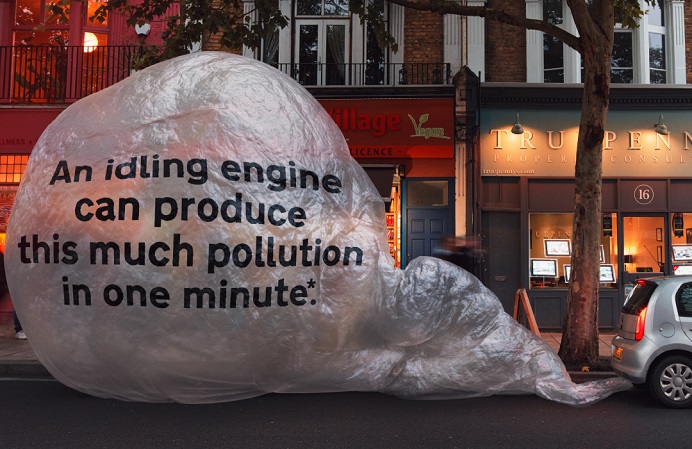
Just over a week ago, we celebrated Clean Air Day (19 June), which aims to highlight the environmental and public health imperative to reduce air pollution and limit harmful emissions. The threat is serious: a new report from the Royal College of Physicians warns that air pollution affects almost every organ in the human body, will contribute to the equivalent of 30,000 deaths in the UK in 2025, and costs more than £27 billion annually.
Transport is one of the worst culprits, which is why we have teamed up with local councillors, teachers, health professionals, children and young people, parents and carers, and environmental and public health organisations to call for action on one of the more straightforward solutions to combat pollution – ending engine idling.
The problem with engine idling
As our briefing on engine idling explains, a significant cause of air pollution is the carbon dioxide, particulate matter and nitrogen oxide emitted from diesel and petrol-powered vehicles. This is exacerbated by engine idling, when drivers leave their engines running in stationary vehicles, allowing for the emission of toxic exhaust fumes to continue unchecked. We know that local air pollution from engine idling is significantly worse than when the car is in motion, and that switching the engine off significantly cuts pollution in comparison to idling, even when stopping for only 30 seconds.
Despite engine idling being banned in Scotland, the practice remains widespread. Polling commissioned by Asthma + Lung UK has found that 78% of Scots are concerned about the level of enforcement of engine idling where they live, and despite hundreds of complaints to local authorities from members of the public, the number of penalties issued to offenders remains in single figures.
Air pollution is often worst at engine idling hotspots such as schools, hospitals and bus stops. The teachers’ union NASUWT has collected testimony from its members across Scotland highlighting the scale of the problem, with one teacher in East Ayrshire stating:
‘It is commonplace. Looking today I can see 20+ cars and two buses sitting outside in the playground with their engines idling.’
Children, older people, pregnant women and people with existing health conditions are those most at risk, with significant evidence linking vehicle emissions to diseases including lung cancer and asthma.
What needs to change
Back in March, we sent a joint letter to the Scottish Government urging stronger enforcement measures. The letter was signed by over twenty organisations and individuals, including doctors, teachers, environmental and public health charities, and the conveners of transport and environment committees at Scotland’s most populous local authorities.
We asked Scottish Ministers to:
- Increase the level of fines from £20 to £80 to effectively deter engine idling.
- Update guidance to encourage local authorities to issue fines as the first point of enforcing the engine idling ban, and extend enforcement powers to parking attendants.
- Require transparent reporting of local authorities’ engine idling enforcement activities to ensure greater accountability.
The response from the Government
Three months later, we received a lacklustre response. The Scottish Government has refused to increase the £20 fine, which remains well below the level of fines issued for offences such as littering or smoking indoors, and has never increased with inflation despite being introduced more than twenty years ago.
Scottish Ministers claim that ‘the vast majority of idling drivers switch off their engines when requested’ to imply the current enforcement regime works, despite the protestations of many councillors with frontline experience of the issue, and declined an invitation to meet with campaigners.
It’s not just civil society who is concerned about the lack of enforcement. Following a representation submitted by ERCS, Environmental Standards Scotland is currently considering the efficacy and enforcement of Scotland’s engine laws, and have asked the Scottish Government to review their guidance to local authorities, as well as the transparency of engine idling enforcement and the current level of Fixed Penalty Notices.
Reasons for optimism
It’s not all bad news. In recent years, the Scottish Government and local authorities have taken positives steps to clean up our air by introducing Low Emission Zones, making public transport cheaper, and improving infrastructure for walking and cycling. In their response to our letter, Scottish Ministers stated that they are reviewing the official guidance issued to local authorities on how the ban is enacted. This is an opportunity to strengthen enforcement measures and stop engine idling from undercutting our local authorities’ efforts to fight air pollution.
Change is coming. The EU has strengthened its legal standards for ambient air quality, following new guidance issued by the World Health Organisation in 2021. The UK House of Lords is considering the adoption of Ella’s Law, which would enshrine the human right to clean air. In Scotland, the Scottish Government have renewed their support for a Scottish Human Rights Bill which, we hope, will include the right to clean air as part of the human right to a healthy environment which is enforceable.
But we do not need to wait to end engine idling.
Benjamin Brown, Policy & Advocacy Officer, July 2025




